Nancy Pelosi says impeachment leaves ‘spring’ in people’s step
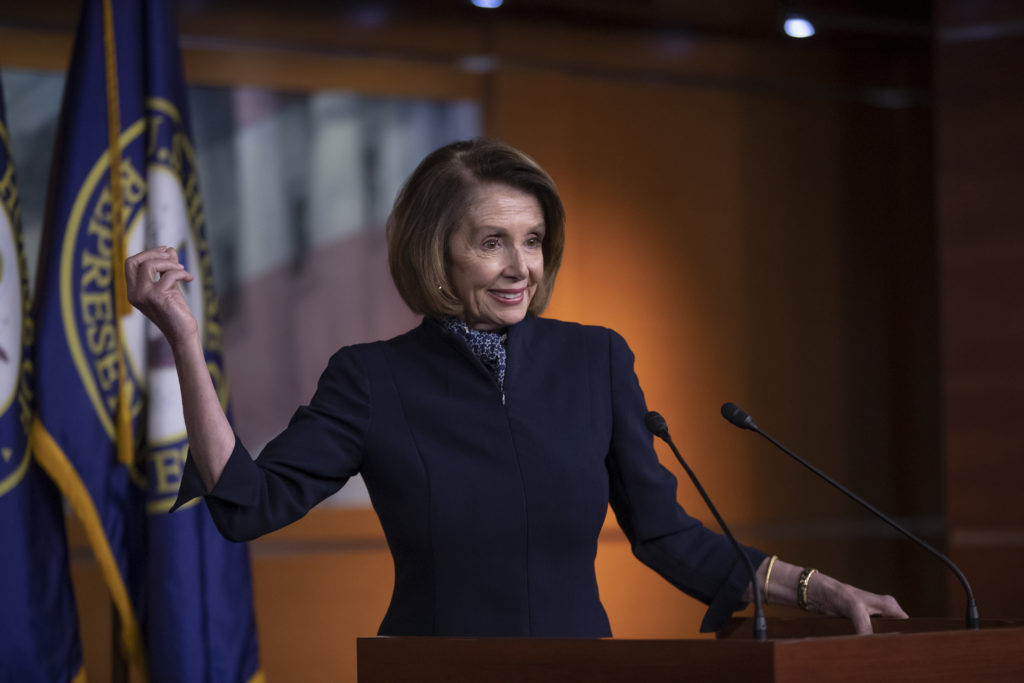
Speaker Nancy Pelosi said Thursday that people have a “spring in their step” after the House impeached President Donald Trump, but she insisted the Senate must provide more details about the expected trial in that chamber before she agrees to send the House charges over. Pelosi’s unexpected procedural delay — looking for leverage in trial arrangements — was getting a sour response from Senate Majority Leader Mitch McConnell and from Trump himself. McConnell said Democrats are “too afraid” to send the charges to the Senate, where Trump would be expected to be acquitted by the Republican majority. Trump tweeted, “Now the Do Nothing Party want to Do Nothing with the Articles.” He claimed that if the Democrats didn’t transmit the articles of impeachment “they would lose by Default,” though there is no constitutional requirement to send them swiftly, or at all. Some White House officials argued that delaying the trial indefinitely actually would play to their advantage and help them make the case that Democrats have manipulated the impeachment process. The trial has been expected to begin in January. Pelosi was upbeat the morning after the historic vote that made Trump only the third president in U.S. history to be impeached. The House impeached Trump on two charges — abusing his presidential power and obstructing Congress — stemming from his pressure on Ukraine to announce investigations of his political rival as Trump withheld U.S. aid. “We’ve been hearing from people all over the country,” Pelosi told reporters at the Capitol. “Seems like people have a spring in their step because the president was held accountable for his reckless behavior.” Pressed about next steps, Pelosi wouldn’t say. Democrats are insisting on more witnesses, testimony and documents than McConnell appears willing to provide before they name the House “managers” who would prosecute Trump in the Senate. “The next thing will be when we see the process that is set forth in the Senate,” Pelosi said. “Then we’ll know the number of managers we may have to go forward and who we would choose.” She said the previous night, “So far we haven’t seen anything that looks fair to us. So hopefully it will be fair. And when we see what that is, we’ll send our managers.” The Democratic speaker and the top Senate Democrat, Chuck Schumer of New York, met privately Thursday at the Capitol after Republican Senate Leader McConnell signaled in the strongest terms yet that his chamber intended to hold a swift trial and acquit the president of both charges. McConnell denounced the “most unfair” House impeachment and reassured Trump and his supporters that “moments like this are why the United States Senate exists.” As for what the Senate would do, he said, “It could not be clearer which outcome would serve the stabilizing, institution-preserving, fever-breaking role for which the United States Senate was created and which outcome would betray it.” McConnell described Trump’s impeachment as “the most rushed, least thorough and most unfair impeachment inquiry in modern history.” Fighting back and using McConnell’s own words, Schumer said the Republican leader was plotting the “most rushed, least thorough and most unfair” impeachment trial in history by declining to agree to call witnesses including former Trump national security adviser John Bolton, who declined to testify before the House. “McConnell claimed the impeachment was motivated by partisan rage,” said Schumer. “This from the man who said proudly, ‘I am not impartial.’” “What hypocrisy.” Pelosi said that McConnell “says it’s OK for the foreman of the jury to be in cahoots with the lawyers of the accused. That doesn’t sound right to us.” McConnell was meeting later Thursday with Schumer to begin negotiations on how to conduct a Senate trial. The two leaders have a tense relationship, and McConnell holds a tactical edge if he can keep his 53-member Senate majority united. Complicating any decision to delay are House Democrats’ arguments in recent weeks that Trump’s impeachment was needed “urgently,” arguing his actions were a threat to democracy and the fairness of the upcoming 2020 election. By Mary Clare Jalonick, Laurie Kellman, and Zeke Miller Associated Press Associated Press writers Alan Fram and Lisa Mascaro contributed to this report. Republished with the Permission of the Associated Press.
Donald Trump impeached by U.S. House on 2 charges
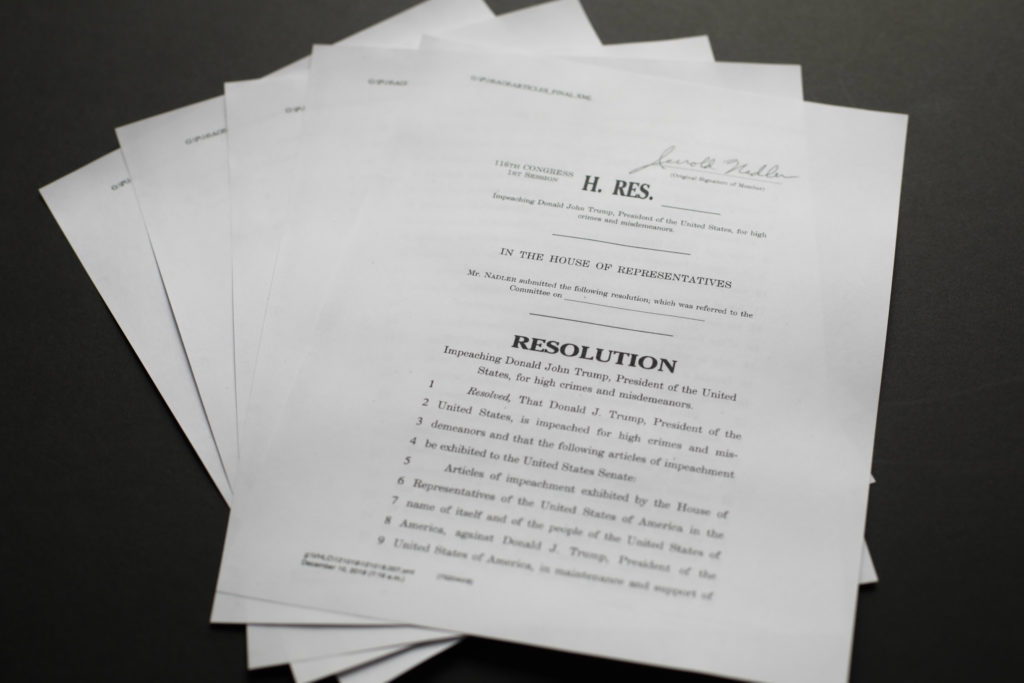
President Donald Trump was impeached by the U.S. House of Representatives Wednesday night, becoming only the third American chief executive to be formally charged under the Constitution’s ultimate remedy for high crimes and misdemeanors. The historic vote split along party lines, much the way it has divided the nation, over a charge that the 45th president abused the power of his office by enlisting a foreign government to investigate a political rival ahead of the 2020 election. The House then approved a second charge, that he obstructed Congress in its investigation. The articles of impeachment, the political equivalent of an indictment, now go to the Senate for trial. If Trump is acquitted by the Republican-led chamber, as expected, he still would have to run for reelection carrying the enduring stain of impeachment on his purposely disruptive presidency. He saw the blame flowing the other direction. He told a political rally in Michigan that “crazy Nancy Pelosi’s House Democrats have branded themselves with an eternal mark of shame.” The votes were 230 for impeachment and 197 against on the first count, 229-198 on the second. Democrats led Wednesday night’s voting, framed in what many said was their duty to protect the Constitution and uphold the nation’s system of checks and balances. Republicans stood by their party’s leader, who has frequently tested the bounds of civic norms. Trump called the whole affair a “witch hunt,” a “hoax” and a “sham,” and sometimes all three. The trial is expected to begin in January in the Senate, where a vote of two-thirds is necessary for conviction. While Democrats had the majority in the House to impeach Trump, Republicans control the Senate and few if any are expected to diverge from plans to acquit the president ahead of early state election-year primary voting. Pelosi, once reluctant to lead Democrats into a partisan impeachment, gaveled both votes closed, risking her majority and speakership to follow the effort to its House conclusion. “Today we are here to defend democracy for the people,” she said earlier during floor debate. Trump, who began Wednesday tweeting his anger at the proceedings, pumped his fist before an evening rally in Battle Creek, Michigan, boasting of “tremendous support” in the Republican Party and saying, “By the way it doesn’t feel like I’m being impeached.” No Republicans voted for impeachment, and Democrats had only slight defections on their side. Voting was conducted manually with ballots, to mark the moment. On the first article, abuse of power, two Democrats, Rep. Jeff Van Drew of New Jersey, who is considering switching parties to become a Republican, and Rep. Collin Peterson of Minnesota voted against impeaching Trump. On the second article, obstruction, those two and freshman Rep. Jared Golden of Maine voted against. Democratic Rep. Tulsi Gabbard of Hawaii, who is running for president, voted “present” on both. What Pelosi called a sad and solemn moment for the country, coming in the first year that Democrats swept control of the House, unfolded in a caustic daylong session that showcased the nation’s divisions — not only along party lines, but also by region, race and culture. The House impeachment resolution laid out in stark terms the two articles of impeachment against Trump stemming from his July phone call when he asked the Ukraine president for a “favor” — to announce it was investigating Democrats ahead of the 2020 election. He also pushed Ukrainian President Volodymyr Zelenskiy to probe unsubstantiated corruption allegations against Joe Biden, the former vice president and 2020 White House contender. At the time, Zelenskiy, a young comedian newly elected to politics, was seeking a coveted White House visit to show backing from the U.S. ally as it confronts a hostile Russia at its border. He was also counting on $391 million in military aid already approved by Congress. The White House delayed the funds, but Trump eventually released the money once Congress intervened. Narrow in scope but broad in its charge, the resolution said the president “betrayed the nation by abusing his high office to enlist a foreign power in corrupting democratic elections,” and then obstructed Congress’ oversight like “no president” in U.S. history. “President Trump, by such conduct, has demonstrated that he will remain a threat to national security and the Constitution if allowed to remain in office,” it said. Republicans argued that Democrats are impeaching Trump because they can’t beat him in 2020. “This vote is about one thing, and one thing only: They hate this president,” said Rep. Chris Stewart, R-Utah. “They want to take away my vote and throw it in the trash.” But Democrats warned the country cannot wait for the next election to decide whether Trump should remain in office because he has shown a pattern of behavior, particularly toward Russia, and will try to corrupt U.S. elections in 2020. “The president and his men plot on,” said Chairman Adam Schiff, Democrat-California, of the Intelligence Committee that led the inquiry. “The danger persists. The risk is real.” The outcome brings the Trump presidency to a milestone moment that has building almost from the time the New York businessman-turned-reality-TV host unexpectedly won the White House in 2016 amid questions about Russian interference in the U.S. election — and the rise of the “resistance.” Democrats drew from history, the founders and their own experiences, as minorities, women and some immigrants to the U.S., seeking to honor their oath of office to uphold the constitution. Rep. Lou Correa, Democrat-California, spoke in Spanish asking God to unite the nation. “In America,” said Rep. Hakeem Jeffries, Democrat-New York, “no one is above the law.” Republicans aired Trump-style grievances about what Arizona Rep. Debbie Lesko called a “rigged” process. “We face this horror because of this map,” said Rep. Clay Higgins, Republican-Alabama, before a poster of red and blue states. “They call this Republican map flyover country, they call us deplorables, they fear our faith, they fear our strength, they fear our unity, they fear our vote, and they fear our president.” The political fallout from the
What to watch as Donald Trump impeachment moved to House floor
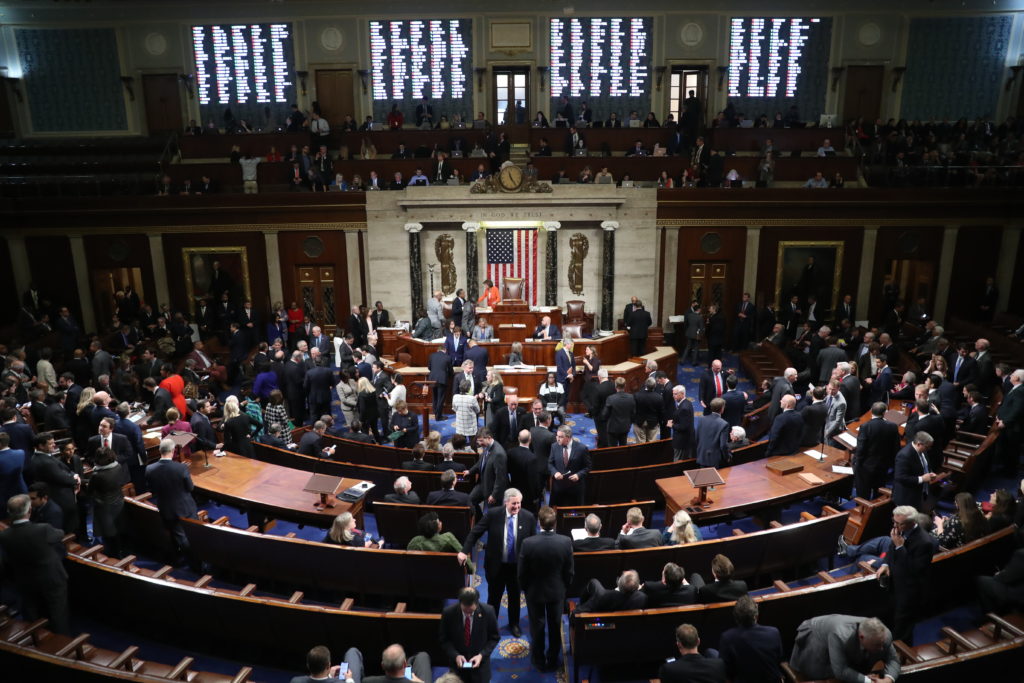
American history is happening in the U.S. House of Representatives. Democrats are driving President Donald Trump to the brink of impeachment Wednesday as the House takes up charges Trump abused his power and obstructed Congress in pressuring Ukraine to investigate political rivals and refusing to cooperate with the ensuing congressional probe. The nation’s 45th president is on track to become only the third commander in chief to be impeached. But first, watch for a daylong showdown that’s been boiling for years between Republicans loyal to Trump and Democrats who say his conduct toward Ukraine makes him unfit for office. Look, too, for legacy moments for Washington’s political veterans on the eve of the 2020 election year. What to watch during a historic day on Capitol Hill that begins at 9 a.m. EST and is expected to end with a final vote between 6:30 and 7:30 p.m.: SPOILER ALERT Trump is heading for impeachment. When the House opens debate, the outcome will have been known for some time. A tally compiled by The Associated Press found that a majority of House members have said they will vote to approve the charges and send them to the Senate for a trial next month. The GOP-led Senate is not expected to convict and remove Trump from office. PARTISANS, MOSTLY Expect most Democrats to vote for impeachment and all Republicans to vote against it. But there are exceptions. One freshman Democrat, Jeff Van Drew of New Jersey, has indicated he will oppose impeachment, then switch parties to become a Republican. Earlier this year, Michigan conservative Rep. Justin Amash left the GOP when he favored impeachment. He is expected to vote yes to impeach. One new Democratic congressman, Jared Golden of Maine, said he would vote to impeach on abuse of power but not obstruction. AMERICANS Expect the House to take the nation’s us-vs-them political culture out for a spin before a global audience. But it’s not clear the proceedings are changing many minds. Trump’s approval ratings have held steady since a whistle-blower report and a partial transcript revealed he had pressured Ukraine’s president to investigate Democrats. Wide shares of Democrats both disapprove of the president and support impeachment, while wide shares of Republicans approve of Trump and want him to remain in office. New polls from The Washington Post/ABC News and CNN find support for impeachment and removal remains at about half of Americans. ‘PROFOUND DISGRACE’ Impeachment will subject Trump to what former Presidents Gerald Ford and Jimmy Carter called a “profound disgrace” that stains a president’s legacy forever. Only two presidents have been impeached: Andrew Johnson in 1868 and Bill Clinton in 1998. Richard Nixon chose to resign instead. Trump has mocked the articles of impeachment as weak. TRUMP’S DAY He’s heading to Michigan, the Democratic state he flipped in 2016. Vice President Mike Pence is on a bus tour across the state and expected to join Trump at the rally in Battle Creek. On the eve of the floor action, Trump gave a nearly six-page preview of his approach in a rambling letter to House Speaker Nancy Pelosi. in which he cast himself as a victim and accused the Democrats of smarting over their election losses. “You are the ones bringing pain and suffering to our Republic for your own selfish, personal political and partisan gain.” PELOSI It’s legacy time for her, too. In her second turn as speaker, the House veteran of more than three decades says relentlessly that impeachment is a somber time, not one for celebration. She says the Clinton impeachment proceedings were too divisive for the county and resisted opening impeachment proceedings against President George W. Bush after the Iraq War. She refused to launch impeachment proceedings against Trump over his obstruction of the Russia investigation, saying she’d be against doing so unless there was bipartisan sentiment for it. That still doesn’t exist for the impeachment articles now headed for passage. But Pelosi has said Trump’s conduct toward Ukraine, while holding up military aid to that country, left her no choice. “Very sadly, the facts have made clear that the President abused his power for his own personal, political benefit and that he obstructed Congress,” Pelosi wrote to colleagues. “In America, no one is above the law.” NEXT STOP: SENATE After votes on each of the two amendments, the House is expected to authorize Pelosi to name a team of prosecutors for the Senate trial. Lobbying for the jobs is well underway. The wagering begins with the two lead House impeachment chairmen, Adam Schiff of Intelligence and Jerrold Nadler of Judiciary, playing roles. The trial is expected to begin in January, with Chief Justice John Roberts presiding. Senate Majority Leader Mitch McConnell and Minority Leader Chuck Schumer have begun negotiating, and sniping, over how the trial will be conducted. McConnell set the partisan tone by declaring that he’s “not an impartial juror.” By Laurie Kellman Associated Press Follow Kellman on Twitter at: http://www.twitter.com/APLaurieKellman Republished with the Permission of the Associated Press.
Democrats lay out case for Wednesday Donald Trump impeachment vote
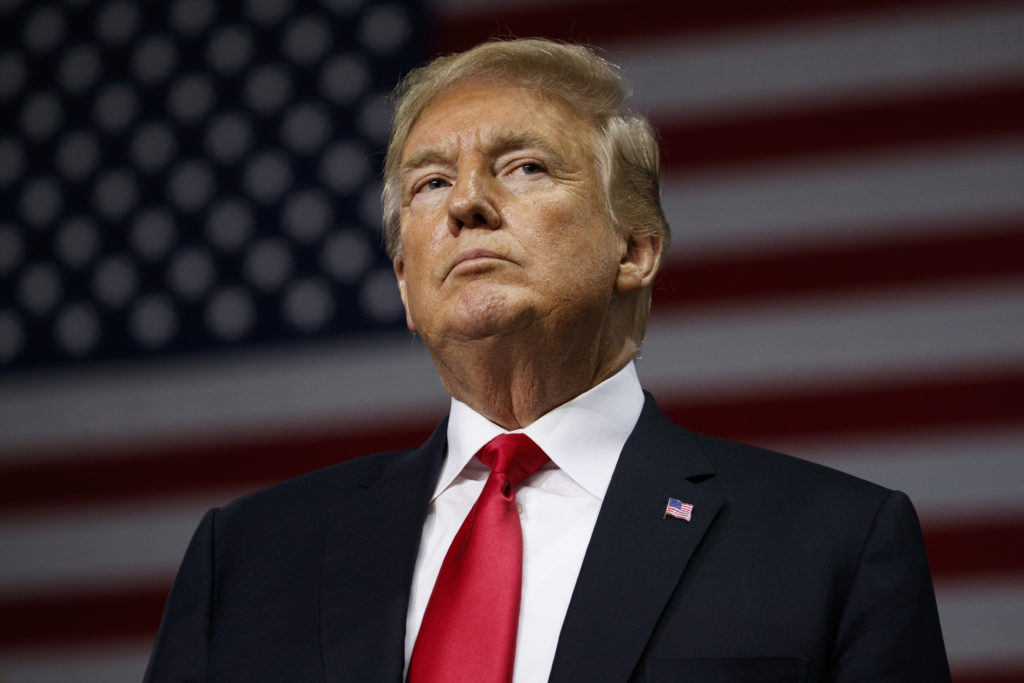
House Democrats laid out their impeachment case against President Donald Trump on Monday, a sweeping report accusing him of betraying the nation and deserving to be ousted, as key lawmakers began to signal where they stand ahead of this week’s landmark votes. What Democrats once hoped would be a bipartisan act, only the third time in U.S. history the House will be voting to impeach a president, is now on track to be a starkly partisan roll call Wednesday. No Republicans are breaking with the president and almost all Democrats are expected to approve the charges against him. A raucous town hall Monday in the Detroit suburbs put on display the nation’s wrenching debate over the unconventional president and the prospect of removing the him from office. Freshman Democratic Rep. Elissa Slotkin was both heckled and celebrated as she announced her support for impeachment. “There’s certainly a lot of controversy about this,” Slotkin told the crowd of 400. “But there just has to be a moment where you use the letter of the law for what they were intended.” Trump faces two articles of impeachment brought by Democrats. They say he abused the power of his office by pressuring Ukraine to investigate Democratic rival Joe Biden and obstructed Congress by aggressively trying to block the House investigation and its oversight duties as part of the nation’s system of checks and balances. The president “betrayed the Nation by abusing his high office to enlist a foreign power in corrupting democratic elections,” says the 650-page report from the House Judiciary Committee. He withheld military aid from the ally as leverage, the report says, and ”Trump, by such conduct, has demonstrated that he will remain a threat to national security and the Constitution if allowed to remain in office.” The report says the president then engaged in an unprecedented attempt to block the investigation and “cover up” his misconduct. “In the history of the Republic, no President has ever ordered the complete defiance of an impeachment inquiry,” it says. Trump, tweeting from the sidelines after instructing the White House not to participate in the House inquiry, insists he has done nothing wrong. He is promoting lawyer Rudy Giuliani’s alternative theory that it was actually Biden and Ukraine that interfered, a conspiracy-laden idea that other most other Republicans are actively avoiding. Sticking to the language he has relied on for months, he tweeted on Monday, “The Impeachment Hoax is the greatest con job in the history of American politics!” As the House prepares for Wednesday’s vote, just a handful of Democrats are expected to break ranks to oppose impeachment as Speaker Nancy Pelosi marches the majority toward a vote she hoped to avoid having Democrats take on their own. One freshman Democrat, Rep. Jeff Van Drew of New Jersey, lost five key staff members Monday after he said he would vote against impeachment and indicated he was switching parties to become a Republican. Another Democrat, Rep. Collin Peterson, a Minnesota centrist, has not decided how he will vote, his spokeswoman said As the House was detailing its case against the nation’s 45th president, attention was turning to the Senate where the top Democrat, Sen. Chuck Schumer of New York, called anew for fresh evidence and testimony from key White House officials for the Senate impeachment trial. “What is President Trump hiding?” Schumer said Monday. Senate Majority Leader Mitch McConnell is hoping to avoid a drawn-out spectacle in his chamber, though Trump, a former reality TV show host, has signaled that is what he prefers as he seeks vindication. Republicans, who hold the majority, are expected to acquit Trump of the charges during a trial starting in January. In a letter to McConnell, Schumer proposed hearing testimony from former national security adviser John Bolton, acting White House chief of staff Mick Mulvaney and two others as part of a detailed offer he made to Republicans as an opening offer for negotiations. Democrats want to hear from Bolton, who once labeled the alternative foreign policy orchestrated by Trump lawyer Giuliani a “drug deal’’ he wanted no part of. Bolton left the White House in September. The Democrats also want to hear from Mulvaney, who has acknowledged the military aid to Ukraine was being held up, as well as two other White House officials who defied House subpoenas to testify. McConnell is facing criticism for saying he’s taking his “cues” from the White House as he ensures Trump there will not be the 67 votes needed in the Senate to convict the president. Democrats complain that he and other Republicans are not operating as impartial jurors. The GOP leader is planning to meet soon with Schumer to discuss the contours of next month’s trial, McConnell’s office said. The report released Monday by the House Judiciary Committee, a historic marker like those produced during impeachment proceedings for Richard Nixon and Bill Clinton, formally lays the groundwork for the vote. It outlines the panel’s findings and includes those from the Intelligence Committee’s months-long investigation that was sparked by a still-anonymous government whistleblower’s complaint about Trump’s July phone call with Ukraine President Volodymyr Zelenskiy. It also includes Republican rebuttals. The House Rules Committee will meet Tuesday in what is expected to be a marathon session to set the parameters for Wednesday’s debate. By Lisa Mascaro and Mary Clare Jalonick Associated Press. Associated Press writers Laurie Kellman and Alan Fram in Washington, David Eggert in Rochester, Mich., and Steve Karnowski in Minnesota contributed to this report. Republished with the Permission of the Associated Press.
Panel vote sends Donald Trump impeachment charges to full House
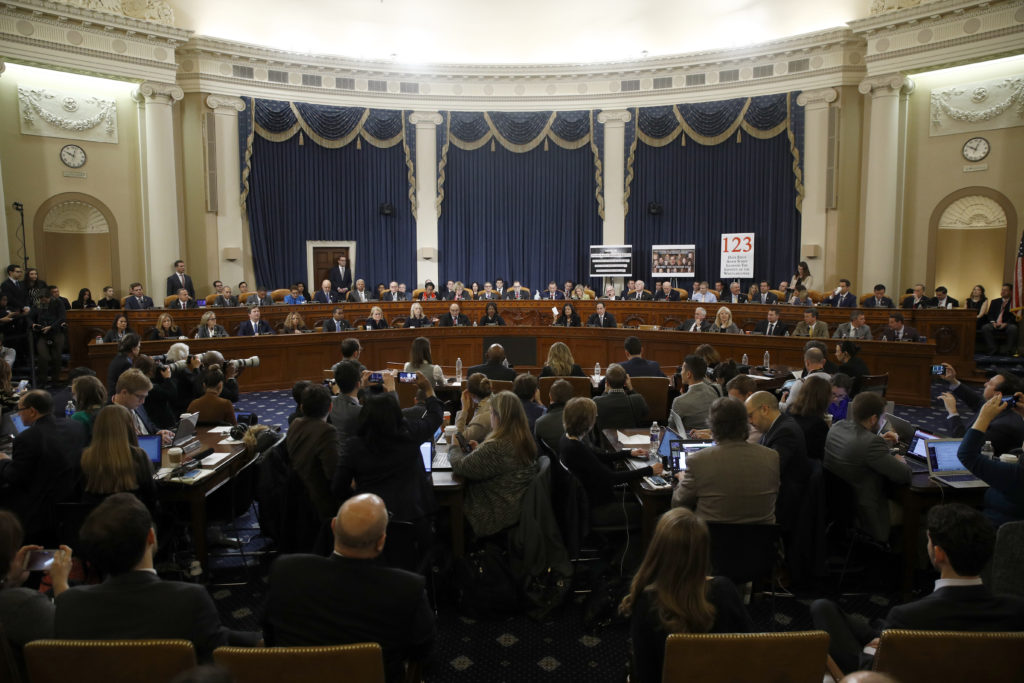
Democrats propelled President Donald Trump’s impeachment toward a historic vote by the full U.S. House on Friday, as the Judiciary Committee approved charges of abuse of power and obstruction of Congress. It’s the latest major step in the constitutional and political storm that has divided Congress and the nation. The House is expected to approve the two articles of impeachment next week, before lawmakers depart for the holidays. The partisan split in the committee vote — 23 Democrats to 17 Republicans — reflects the atmosphere in Congress. The Democratic-majority House is expected to approve the charges against Trump next week, but the Republican-controlled Senate is likely to acquit him after a January trial. Trump is accused, in the first article, of abusing his presidential power by asking Ukraine to investigate his 2020 rival Joe Biden while holding military aid as leverage, and, in the second, of obstructing Congress by blocking the House’s efforts to probe his actions. “Today is a solemn and sad day,” Chairman Jerrold Nadler, Democrat-New York, told reporters after the session, marking the third time in U.S. history the panel had voted to recommend impeaching a president. He said the full House would act ”expeditiously.”‘ After the milestone votes, Trump’s press secretary, Stephanie Grisham, labeled the proceedings a “desperate charade” and said, “The President looks forward to receiving in the Senate the fair treatment and due process which continues to be disgracefully denied to him by the House.” Voting was swift and solemn, with none of the fiery speeches and weighty nods to history that have defined the previous debating, including 14 hours that stretched nearly to midnight Thursday. Nadler abruptly halted that session so voting could be held in daylight, for all Americans to see. Nadler, who had said he wanted lawmakers to “search their consciences” before casting their votes, gaveled in the landmark but brief morning session. Lawmakers responded “aye” or “yes” for the Democrats, and simple:”no’s” from the Republicans. “The article is agreed to,” Nadler declared after each vote. The top Republican on the panel Rep. Doug Collins of Georgia immediately said he would file dissenting views. Minutes after the morning session opened, it was gaveled shut. Trump is only the fourth U.S. president to face impeachment proceedings and the first to be running for reelection at the same time. The outcome of the eventual House votes pose potentially serious political consequences for both parties ahead of the 2020 elections, with Americans deeply divided over whether the president indeed conducted impeachable acts and if it should be up to Congress, or the voters, to decide whether he should remain in office. The outcome came quickly after two days of hearings at the Capitol and the rancorous 14-hour session that was shut down when the Democratic majority refused to be forced, after a long and bitter slog through failed Republican amendments aimed at killing the impeachment charges, into midnight voting. Instead, the impeachment charges against Trump were aired in full view. Trump took to Twitter early Friday to praise the panel’s Republicans, saying “they were fantastic yesterday.” “The Dems have no case at all, but the unity & sheer brilliance of these Republican warriors, all of them, was a beautiful sight to see,” he tweeted. “Dems had no answers and wanted out!” The president has refused to participate in the proceedings, tweeting criticisms as he did Thursday from the sidelines, mocking the charges against him in the House’s nine-page resolution as “impeachment light.” But House Speaker Nancy Pelosi said the president was wrong and the case against him is deeply grounded. Democrats contend that Trump has engaged in a pattern of misconduct toward Russia dating back to the 2016 election campaign that special counsel Robert Mueller investigated. And they say his dealings with Ukraine have benefited its aggressive neighbor Russia, not the U.S., and he must be prevented from “corrupting” U.S. elections again and cheating his way to a second term next year. “It is urgent,” House Speaker Nancy Pelosi said. But Senate Majority Leader Mitch McConnell said late Thursday on Fox News, “There is zero chance the president will be removed from office.” He said he was hoping to have no GOP defections in the Senate trial next year. The Judiciary Committee session drew out over two days, much of time spent in fights over amendments. After lawmakers trudged through two days of hearings, tempers still flared Friday. “My vote is no,” said Rep. Louie Gohmert, Republican-Texas. Then, before the tally was announced, he inquired how his vote was recorded by the clerk. “I want to make sure.” Later he echoed Trump’s criticism of the proceedings: “It was a witch hunt.” Florida GOP Rep. Matt Gaetz said, “For Democrats, impeachment is their drug, it is their obsession, it is their total focus.” Nadler said late Thursday night, after presiding over the two-day session, “I want the members on both sides of the aisle to think about what has happened over these past two days and to search their consciences before they cast their final votes.” The Republicans on the panel, blindsided by the move to Friday, were livid. When Nadler announced it, they started yelling “unbelievable” and “they just want to be on TV.” Congress was to be out of session on Friday, and many lawmakers had other plans, some outside Washington. “This is the kangaroo court that we’re talking about” stormed Rep. Doug Collins of Georgia, the top Republican on the panel, who said he had not been consulted on the decision. Debate over amendments had dragged on with familiar arguments: Democrats cited evidence they said showed Trump’s misconduct, while Republicans insisted the entire investigation was bogus. Typical was the first amendment, offered by GOP Rep. Jim Jordan of Ohio, who tried to delete the first charge against Trump. “This amendment strikes article one because article one ignores the truth,” he declared. Rep. David Cicilline, Democrat-Rhode Island, argued there was “overwhelming evidence” that the president with his lawyer Rudy Giuliani, in pushing Ukraine to investigate rival Biden, was
Democrats unveil Donald Trump impeachment charges
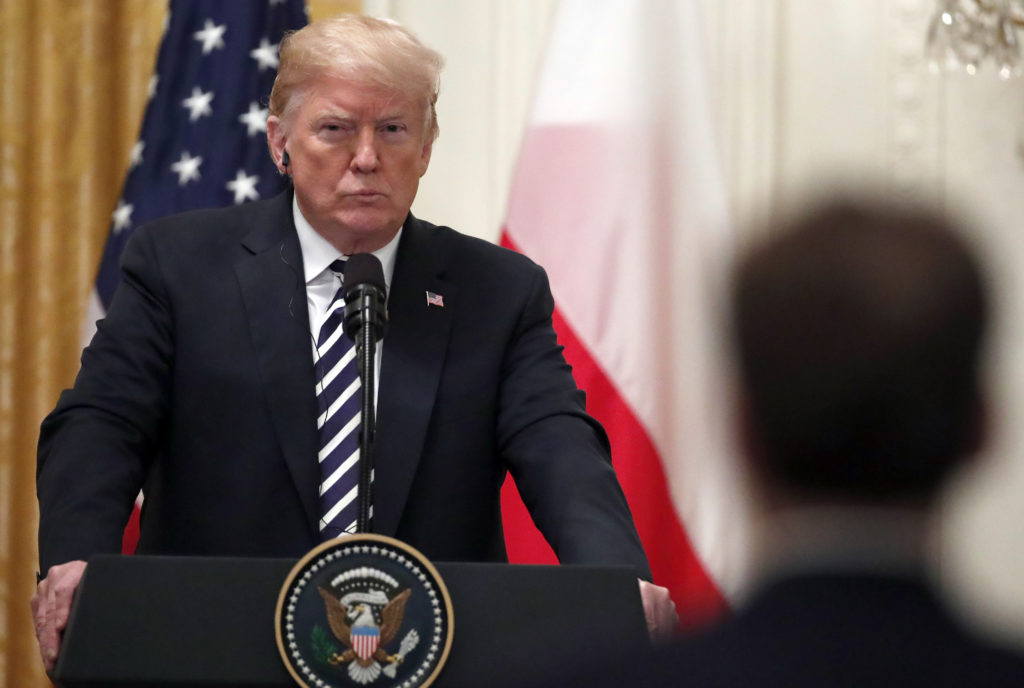
House Democrats announced two articles of impeachment Tuesday against President Donald Trump, declaring he “betrayed the nation” in his actions toward Ukraine as they pushed toward historic proceedings that are certain to help define his presidency and shape the 2020 election. The specific charges aimed at removing the 45th president of the U.S.: abuse of power and obstruction of Congress. Speaker Nancy Pelosi, flanked by the chairmen of the impeachment inquiry committees, said somberly at the U.S. Capitol that they were upholding their solemn oath to defend the Constitution. Trump responded angrily on Twitter: “WITCH HUNT!” Voting is expected in a matter of days by the Judiciary Committee, and by Christmas in the full House. The charges, if approved, would then be sent to the Senate. The Republican majority in the Senate would be unlikely to convict Trump. But first there would be a trial filled with bitter accusations and recriminations just as voters in Iowa and other early presidential primary states begin making their choices. In the formal articles announced Tuesday, the Democrats said Trump enlisted a foreign power in “corrupting” the U.S. election process and endangered national security by asking Ukraine to investigate his political rivals, including Democrat Joe Biden, while withholding U.S. military aid as leverage. That benefited Russia over the U.S. as America’s ally fought Russian aggression, the Democrats said. Trump then obstructed Congress by ordering current and former officials to defy House subpoenas for testimony — some testified anyway — and by blocking access to documents, the charges say. By his conduct, Trump “demonstrated he will remain a threat to national security and the Constitution if allowed to remain in office, ” the nine-page impeachment resolution says. After decrying the Democrats’ announcement, Trump headed to Pennsylvania for a reelection campaign rally. First, he tweeted, “To Impeach a President who has proven through results, including producing perhaps the strongest economy in our country’s history, to have one of the most successful presidencies ever, and most importantly, who has done NOTHING wrong, is sheer Political Madness,.” The outcome, though, appears increasingly set as the House presses ahead toward impeachment as it has only three times in history against U.S. presidents. In outlining the charges, Democrats said they had no choice but to act because Trump has shown a pattern of behavior that, if left unchecked, poses risks to the democratic process ahead of the 2020 election. “Our president holds the ultimate public trust. When he betrays that trust and puts himself before country, he endangers the Constitution; he endangers our democracy; he endangers our national security,” said Rep. Jerrold Nadler, Democrat-New York, the Judiciary chairman, announcing the charges before a portrait of George Washington. “Our next election is at risk. … That is why we must act now.” Nadler said, “No one, not even the president, is above the law.” Chairman Adam Schiff of the Intelligence Committee said, “We stand here today because the president’s abuse of power leaves us with no choice.” Trump’s allies immediately plunged into the fight that will extend into the new year. White House Press Secretary Stephanie Grisham said Democrats are trying to “overthrow” the administration. Campaign manager Brad Parscale said Democrats are “putting on this political theater because they don’t have a viable candidate for 2020 and they know it.” The president’s son, Eric, embraced his father’s penchant for name calling, assailing Pelosi and “her swamp creatures.” In drafting the articles of impeachment, Pelosi faced a legal and political challenge of balancing the views of her majority while hitting the Constitution’s bar of “treason, bribery or other high crimes and misdemeanors.” Some liberal lawmakers wanted more expansive charges encompassing the findings from special counsel Robert Mueller’s probe of Russian interference in the 2016 election. Centrist Democrats preferred to keep the impeachment articles more focused on Trump’s actions toward Ukraine. The final resolution attempted to find common ground by linking the findings in the Ukraine inquiry to the Mueller probe in two lines, without specifically mention the Russia investigation. It said the abuse of power was consistent with “previous invitations of foreign interference in United States elections” while the obstruction charge was consistent with Trump’s previous efforts to undermine “United States government investigations into foreign interference.” As the House chairmen arrived at a closed-door meeting of the chamber’s Democrats after the announcement, they were greeted with applause. Democratic leaders say Trump put his political interests above those of the nation when he asked Ukraine President Volodymyr Zelenskiy in a July phone call to investigate his rivals, including Democrat Joe Biden, and then withheld $400 million in military aid as the U.S. ally faced an aggressive Russia. They say he then obstructed Congress by stonewalling the House investigation. The articles say Trump “used the powers of the presidency in a manner that compromised the national security of the United States and undermined the integrity of the United States democratic process.” The first article, on abuse of power, says Trump “corruptly” solicited Ukraine to investigate his political rivals and required the investigations if the country expected the release of military aide that Congress had already approved as well as a White House meeting with Zelenskiy. The second article, obstruction of Congress, says that Trump has “directed the unprecedented, categorical and indiscriminate defiance of subpoenas” issued by the House, and that such behavior was “offensive to, and subversive of” the Constitution. “In the history of the republic, no president has ever ordered the complete defiance of an impeachment inquiry or sought to obstruct and impede so comprehensively the ability of the House of Representatives to investigate ‘high crimes and misdemeanors,’” the second article reads. Trump insisted in a new tweet that when he asked Ukraine’s president “to do us a favor” with the investigations, “’us’ is a reference to USA, not me!” Democrats, however, say Trump’s meaning could not have been clearer in seeking political dirt on Biden, his possible opponent in the 2020 election. When asked Monday night if she had enough votes to impeach the Republican president, Pelosi said House member
Congresswoman Katie Hill resigns amid ethics investigation

Freshman Rep. Katie Hill, a rising Democratic star in the House, announced her resignation amid an ethics probe, saying explicit private photos of her with a campaign staffer had been “weaponized” by her husband and political operatives. The California Democrat, 32, had been hand-picked for a coveted leadership seat. But in recent days, compromising photos of Hill and purported text messages from her to a campaign staffer surfaced online in a right-wing publication and a British tabloid. House Speaker Nancy Pelosi said Hill had acknowledged “errors in judgment” that Pelosi said made her continued service in Congress “untenable.” The House ethics committee had launched an investigation into whether Hill had an inappropriate relationship with an aide in her congressional office, which is prohibited under House rules. Hill, one of the few openly bisexual women in Congress, has denied that and vowed to fight a “smear” campaign waged by a husband she called abusive. But her relationship with the campaign aide became a concern for House Democrats who have made equality in the workplace a particular priority. On Sunday, after apologizing for the relationship with a subordinate, Hill announced she was stepping aside. “It is with a broken heart that today I announce my resignation from Congress,” she wrote in a statement released Sunday. “Having private photos of personal moments weaponized against me has been an appalling invasion of my privacy. It’s also illegal, and we are currently pursuing all of our available legal options,” she added. “However, I know that as long as I am in Congress, we’ll live fearful of what might come next and how much it will hurt.” Hill’s statement provided no details on that or when she would step down. Hill’s office and campaign provided no additional public comment. Pelosi, Democrat-California, praised Hill in a statement Sunday for bringing “a powerful commitment to her community and a bright vision for the future” to the House but added: “She has acknowledged errors in judgment that made her continued service as a Member untenable. We must ensure a climate of integrity and dignity in the Congress, and in all workplaces.” Pelosi picked Hill for a coveted leadership seat. Hill had also been named vice chair of the powerful House Oversight Committee. Hill’s abrupt fall came after a blazing rise in which she won the last Republican-held House seat anchored in Los Angeles County, part of a rout that saw GOP House members driven out of their seats in Southern California. She was elected by 9 percentage points last year, ousting two-term Republican Rep. Stephen Knight and capturing the district for her party for the first time since 1990. Democratic presidential candidate Hillary Clinton carried the district in 2016 by 7 points.Hill’s campaign had raised a healthy $2.2 million so far this year, putting her on track for a strong reelection bid. Citing the more than 4-in-10 district voters from minority groups, Rep. Cheri Bustos, Democrat-Illnois, who heads House Democrats’ campaign committee, said there was “no doubt” her party would hold the district next year. But Rep. Tom Emmer, Republican-Minnesota, chairman of the House GOP campaign arm, said Republicans “look forward to winning back this seat.” In recent days, Hill’s Los Angeles-area constituents were wrestling with questions about who might have been wronged, how much it matters and whether any punishment was warranted. Hill, celebrated as a face of millennial change in Congress, said in her statement that she had no choice but to step down. “This is what needs to happen so that the good people who supported me will no longer be subjected to the pain inflicted by my abusive husband and the brutality of hateful political operatives who seem to happily provide a platform to a monster who is driving a smear campaign built around cyber exploitation,” Hill said. “I can no longer allow my community, family, friends, staff, supporters, and especially the children who look up to me as a role model, to suffer this unprecedented brand of cruelty.” She apologized to “people who have been hurt.” She’s asked U.S. Capitol Police to investigate potential legal violations for posting and distributing the photos online without her consent. Hill is divorcing her husband, Kenneth Heslep, and says he is abusive. While not providing any evidence of abuse, Hill says she turned elsewhere for companionship because of their turbulent relationship and lamented that “the deeply personal matter of my divorce has been brought into public view.” In court papers, Heslep sketches a different story, one in which he was rejected by an ambitious wife after agreeing to her request that he play the role of house-husband, while she pursued her career aspirations. He said she left him soon after being elected to Congress. “Our agreement was that I would stay at home and take care of all the domestic duties and responsibilities while (Hill) worked,” Heslep said in documents filed in July in Los Angeles Superior Court. He did not allege any extramarital affairs by his wife. By Laurie Kellman Associated Press. Republished with the permission of the Associated Press.
Hope Hicks rebuffs questions on Donald Trump White House in interview

Former top White House adviser Hope Hicks refused to answer questions related to her time in the White House in a daylong interview with the House Judiciary Committee, dimming Democrats’ chances of obtaining new or substantive information about President Donald Trump in their first interview with a person linked to his inner circle. Frustrated Democrats leaving the meeting Wednesday said Hicks and her lawyer rigidly followed White House orders to stay quiet about her time there and said they would be forced to go to court to obtain answers. House Judiciary Committee Chairman Jerrold Nadler, Democrat-New York, said Hicks’ lawyers asserted the White House’s principle that as one of Trump’s close advisers she is “absolutely immune” from talking about her time there because of separation of powers between the legislative and executive branches. Nadler said that principle is “ridiculous” and Democrats intend to “destroy” it in court. Nadler said the committee plans to take the administration to court on the immunity issue, and Hicks’ interview would be part of that litigation. In a letter Tuesday to Nadler, White House counsel Pat Cipollone wrote that Trump had directed Hicks not to answer questions “relating to the time of her service as a senior adviser to the president.” The White House has similarly cited broad executive privilege with respect to many of the Democrats’ other investigative demands, using the president’s power to withhold information to protect the confidentiality of the Oval Office decision-making process. Hicks did answer some questions about her time on Trump’s campaign, the lawmakers said, but they said they learned little that was new. “She’s objecting to stuff that’s already in the public record,” California Rep. Karen Bass said on a break from the interview. Rep. Pramila Jayapal, Democrat-Washington, called her answers “a farce.” California Rep. Ted Lieu tweeted about the meeting while it was ongoing, writing that Hicks refused to answer even innocuous questions such as whether she had previously testified before Congress and where her office was located in the White House. In all, she was behind closed doors for eight hours, with an hourlong break for lunch. Democrats pressed Hicks on episodes she might have witnessed as one of Trump’s closest advisers. During questioning about the campaign, Rep. Madeleine Dean, Democrat-Pennsylvania, said she asked Hicks if she had been aware of any outreach from the Russians. After Hicks responded no, Dean named apparent contacts, such as emails, some of which are mentioned in special counsel Robert Mueller’s report. Hicks said she hadn’t thought those contacts were “relevant,” according to Dean. Republicans had a different perspective, saying she was cooperative and the interview was a waste of time, especially in light of Mueller’s two-year investigation. The top Republican on the panel, Georgia Rep. Doug Collins, said after the interview that the committee “took eight hours to find out what really most of us knew at the beginning.” Hicks was a key witness for Mueller, delivering important information to the special counsel’s office about multiple episodes involving the president. Mueller wrote in his report released in April that there was not enough evidence to establish a criminal conspiracy between Trump’s 2016 campaign and Russia, but said he could not exonerate Trump on obstruction of justice. The report examined several situations in which Trump attempted to influence or curtail Mueller’s investigation. Democrats has planned to ask Hicks about several of those episodes, including efforts to remove Mueller from the investigation, pressure on former Attorney General Jeff Sessions and the firing of FBI Director James Comey. They also planned to ask about Hicks’ knowledge of hush-money payments orchestrated by former Trump lawyer Michael Cohen to two women who claimed to have had affairs with Trump — the porn actress Stormy Daniels and model Karen McDougal. Trump has denied the allegations. Cohen is now serving three years in prison partly for campaign violations related to the payments. One lawmaker who was in the room said Hicks would not answer many of those questions. The person requested anonymity to discuss the closed-door interview. As Hicks spoke to the committee, Trump tweeted throughout the day. He said the interview was “extreme Presidential Harassment,” and wrote that Democrats “are very unhappy with the Mueller Report, so after almost 3 years, they want a Redo, or Do Over.” He also tweeted that it was “so sad that the Democrats are putting wonderful Hope Hicks through hell.” Trump has broadly stonewalled House Democrats’ investigations and said he will fight “all of the subpoenas.” House Speaker Nancy Pelosi is taking a methodical approach to investigating Trump. More than 60 lawmakers in her caucus — including around a dozen on the Judiciary Committee — have called for opening an impeachment inquiry, but she has said she wants committees to investigate first and come to a decision on impeachment later. While Trump has continued to block their requests, Democrats have recently made some minor gains, such as the Justice Department’s agreement to make some underlying evidence from Mueller’s report available to committee members. The Judiciary panel wanted a higher-profile interview with Hicks, subpoenaing her for public testimony. But they agreed to the private interview after negotiations. A transcript of the session will be released in the coming days. The committee has also subpoenaed Hicks for documents, but she has only partially complied. She agreed to provide some information from her work on Trump’s campaign, but none from her time at the White House because of the administration’s objections. Also Wednesday, House Intelligence Committee Chairman Adam Schiff said Russia-born business executive Felix Sater will talk to House intelligence committee staff behind closed doors as part of its investigation into Russian election interference. Schiff wouldn’t give a date for the interview, but another person familiar with the meeting said it will happen Friday. The person requested anonymity to discuss the private interview. Sater worked with Cohen on a Trump Tower deal in Moscow before the 2016 election. The project was later abandoned. Schiff said the committee will also talk to


